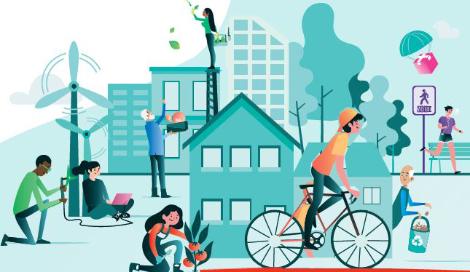Tomorrow my territory 02 Eat good, healthy and local food in the canteens of my territory
Sustainable food
November 2019
Agence pour l’Environnement et la Maîtrise de l’Energie (ADEME)
The 20 factsheets in the collection « demain MON TERRITOIRE » have been designed to give candidates and elected officials practical keys to take action, to open up the field of possibilities based on the experiences of other elected officials, from small towns to conurbations, large urban areas or sparsely populated areas. In the four corners of France, both in metropolitan France and in the French Overseas Territories, many of them are taking action, together with the players in their territories, to prepare for the future by taking action to mitigate climate change and adapt to its effects. With its knowledge and presence throughout the country, ADEME supports them with its tools, activities and financial aid.

Why is it important for the catering industry to offer sustainable food?
The way we feed ourselves is not good for our health or for the planet. Too much fat, sugar and animal protein increases the risk of obesity, diabetes, cardiovascular disease and climate change. We need to make more use of seasonal, locally produced, organic and agro-ecological foods, but also reduce meat consumption and cut down on waste. With 3 billion meals served each year, collective catering plays a major role in the diet of French people, both young and old. It is one of the key players in the food transition.
How do you do it?
-
In the canteen and the self, we change our diet. The menus offer less meat but of better quality and compensate with more legumes, cereals and seasonal products. The specifications are being revised, introducing clauses on the presence of food labels, geographical indications, vegetarian meals, etc.
-
We are reorganizing the supply, giving priority to short circuits. Sourcing from local farmers enables them to support local economic activity, reduce transport and losses, and improve their knowledge of product quality and origin.
-
Communities have an obligation to combat food waste in the canteens they manage. This is being stepped up. Through an effective action plan, it is possible to reduce the amount of food going to the trash by 50%. The savings made then make it possible to introduce more organic products, without increasing the cost price of the meals.
-
We work on the causes of waste (type of menus, portion size, nature of food, management of leftovers, etc.). We adjust the project by collecting the opinion of the users. Training of catering staff. The students are made aware of the problem with adapted teaching tools.
-
All of these actions can constitute a « territorial food project » (PAT), with the help of the State, to support local agricultural sectors and raise awareness among citizen consumers: a win-win situation!
Food labels
4 official environmental labels indicate products from organic farming (French and European AB), those from high environmental value farming (HVE) and those from sustainable fishing.
Other labels, supervised by the public authorities, designate the quality or origin of the products: Label Rouge, AOC (Appellation d’origine contrôlée), IGP (Indication géographique protégée).